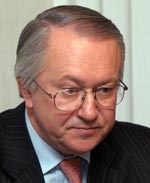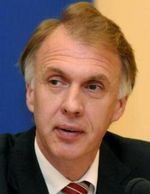Third is a crowd
Experts on Kyiv’s initiative to involve Moscow in its dialogue with the EUOn the eve of the Eastern Partnership Summit in Vilnius, after the text of the Association Agreement and Free Trade Area Agreement was initialed and coordinated, Kyiv made an unexpected statement that there is a need to involve a third party, Russia, in the discussion of relations between Ukraine and the EU. On the other hand, Germany’s Chancellor Angela Merkel stated that she will speak about Ukraine with Russian President Vladimir Putin.
The Day asked former ministers of foreign affairs to answer the following two questions:
1. What is your attitude to involving Russia in the dialogue between Ukraine and the EU on Association Agreement?
2. Could you comment on the statement made by Germany’s Chancellor Angela Merkel about her intention to discuss Ukraine and Eastern Partnership with Putin (without Ukraine’s participation)?
“I WOULD NOT EXCLUDE THE POSSIBILITY OF SIGNING THE AGREEMENT IN VILNIUS”
Borys TARASIUK, former minister of foreign affairs (1998-2000, 2005-06):
 “The Association Agreement is a bilateral document, which is a result of bilateral negotiations between Ukraine and the European Union, and this agreement has nothing to do with any third party, including Russia. Based on these evident facts, as well as the refusal of the third party (this time the European Union) from these negotiations, I think it is a bad idea.
“The Association Agreement is a bilateral document, which is a result of bilateral negotiations between Ukraine and the European Union, and this agreement has nothing to do with any third party, including Russia. Based on these evident facts, as well as the refusal of the third party (this time the European Union) from these negotiations, I think it is a bad idea.
“Nobody forbids any leader of any state to speak about things whenever they find it necessary. Therefore I think it is Angela Merkel’s right to broach any questions she finds necessary with Russia’s president. Even if it is the question of Ukraine, why not?
“We have a regime when one person decides on everything in the state. The name of this person is President Yanukovych.
“I would not exclude the possibility of signing the Association Agreement in Vilnius. Taking into consideration the fact that our president is playing with the European Union like a gambler, his goodwill would be enough to sign the agreement. Actually, the statements made by EU leaders are proof of this.”
“IF WE SPEAK WITH THE EU, LET US SETTLE OUR QUESTIONS AND PROBLEMS WITH THE EU”
Volodymyr OHRYZKO, former minister of foreign affairs of Ukraine (2007-09):
 “The European side has already replied to this question, but stating clearly and unequivocally that it does not see itself as a third party in bilateral negotiations (between Ukraine and Russia), like it does not see Russia in EU’s bilateral negotiations with Ukraine. This is an absolutely well-reasoned stand. Third is a crowd here. This format has been offered by Moscow, but, like Russian president said, ‘before the decision is made.’ If we translate this phrase from diplomatic language into common language, they want to dictate their terms to Ukraine and the European Union. Apparently, the EU will never agree with such an approach. But the fact that the Ukrainian side is making such an offer indicates that its attitude to this process is very serious. If we talk to the European Union, let’s settle our questions and problems with the EU, rather than involve a third party, which will dictate the conditions that are advantageous only for this party.
“The European side has already replied to this question, but stating clearly and unequivocally that it does not see itself as a third party in bilateral negotiations (between Ukraine and Russia), like it does not see Russia in EU’s bilateral negotiations with Ukraine. This is an absolutely well-reasoned stand. Third is a crowd here. This format has been offered by Moscow, but, like Russian president said, ‘before the decision is made.’ If we translate this phrase from diplomatic language into common language, they want to dictate their terms to Ukraine and the European Union. Apparently, the EU will never agree with such an approach. But the fact that the Ukrainian side is making such an offer indicates that its attitude to this process is very serious. If we talk to the European Union, let’s settle our questions and problems with the EU, rather than involve a third party, which will dictate the conditions that are advantageous only for this party.
“Our current political class (to much regret, this refers to many representatives of the opposition, too) has not grown to understanding of the national interest of the state it is supposed to present. At the moment the question is as follows: we must sign the Association Agreement and achieve this with the help of the entire Ukrainian community. And after that we will have to reset our political system, we need to hold next parliamentary elections, because what has taken place in parliament has proved: it is unable to make agreements and think of the national interests of Ukraine. We also need the candidates in the presidential elections to reflect the interests of the community, not of a separate group or clans. It is high time for the opposition to say: WE WILL HAVE ONE CANDIDATE IN THE FIRST ROUND. If it fails to do so, it will ultimately discredit itself.
“As for Merkel’s statement, I would like very much that such an influential leader as Merkel understood as a result that, unfortunately, Russian policy has remained unchanged for many years. Today it is the economic pressure on Ukraine. The Russian policy has changed its form, not its essence. I would like European politicians to understand that it is hard to make agreements with such a ‘strategic partner,’ that we finally need not only to speak about partnership, but also start to act. I would like very much that the words of European politicians that they have seen and understood real Russian politics will finally lead to practical actions. There is no other way. The rest is self-cradling and deceit of own electorate. Sometimes diplomats must say frank, although unpleasant, words, which must be followed by action. They need to defend their values with actions, not words.”






